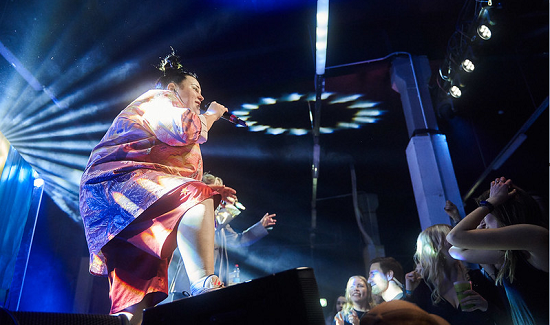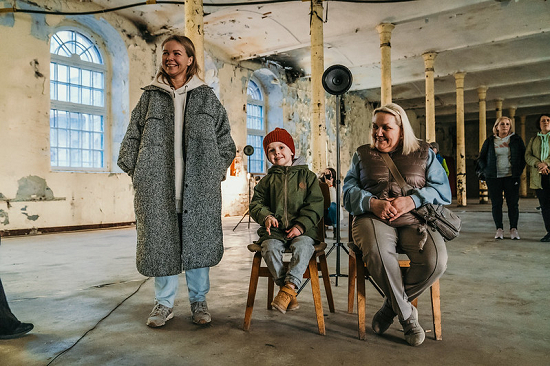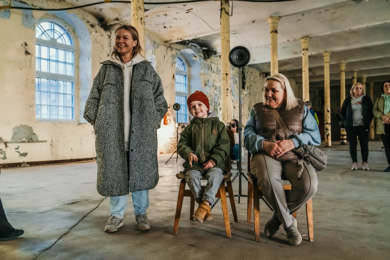Jaakko Autio’s sound installation On The Border / Rajalla. Photo by Anna Markova
Picture this: a cold, damp, dusk in the courtyard of a huge, semi-derelict mill complex called Kreenholm. We could be in South Lancashire in 1978, but we are not; we are within yards of the Russian-Estonian border attending the Narva leg of Tallinn Music Week. Rain gusts in from the mouth of the river Neva. Groups of festival goers huddle under the arches or under the awnings of food stalls and stamp their feet in the mud. At the end of the courtyard is a stage, where one of Estonia’s great rapper-producer partnerships, Genka and DEW8 play their LP OLEG and then pass the mic to a crack team from the UK’s Blah Records. The music is really good: Genka’s bear-like presence and robust delivery in particular lending a real gravitas. But the weather threatens to put a kibosh on things. When Tirzah plays her beautiful music to damp and shivering clumps of people, things feel a little flat. Seen at a semi-dry distance, her live set – which revolves around subtleties and stillness – is like a magic lantern show without the silhouettes. The black stage and the bright flashing lights emanating from it resemble nothing more than a huge television screen, flashing out its last cathode rays into the gloaming. Things warm up considerably for an acid-tanged set from Floating Points and freaky dancing ensues, but by then people are too wet not to care.
Why are we here? It feels somewhat churlish to point out why: I have written previously about Narva in this publication, here but that was in a different, maybe more carefree time. The concept of soft power may be a very good thing, but it is a shape-shifting, slow-cooking one that will need to take stock in the wake of Russia’s brutal and illegal invasion of Ukraine.
To my way of thinking the activities at Narva are yet another emanation of the restless, can-do energy of those behind Tallinn Music Week. Tallinn Music Week needed to be in Narva in 2022: what they did there was irrelevant, as the spirit of those Narvans who attended would find a way to make the experiences and knowledge theirs over time. Other, more industry-led events would have created cultural set pieces that were empty gestures with no societal value. At Narva, the opening Arvo Pärt concert in the Russian Orthodox cathedral was a true inter-civic coming together and one that could have a long-lasting effect on those who were there. Pärt, don’t forget, is in many ways a symbol of Estonian identity and independence. Under the collective, forbidding gaze of many an ikon, Narvans, emotionally battered Russians in exile (many with Narvan family), swanky Tallinners (flash knitwear is the giveaway) and bemused international visitors – believers and unbelievers all – drank in Pärt’s gloriously patient and forgiving high church music as if it was an elixir.
Many have spoken about the responsibilities of artists in the wake of February 24. And in both Tallinn and Narva it was the women who spoke out openly onstage. Unsurprisingly Ukrainian rapper Alyona Alyona’s set at Võnge Festival Stage was a blazing riot of emotion, beats, humour and no-nonsense anti-Putin proselytising. In Narva’s cool Vaba Lava venue, well-loved folk singer Mari Kalkun openly called out Russian aggression whilst diving deep into the ur-sound of her native land; creating a devastatingly beautiful show. It felt like women dominated the stages in both cities this year, creating much-needed antidotes and wry commentary to all that ghastly sabre rattling. It feels unfair not to write about the magic rustled up by Estonian folk practitioners such as Tuulikki Bartosik, or new two-piece Duo Ruut. Their shows, employing the ancient traditions and instruments of Baltic and Nordic folk music, were crystalline in sound, strong as reeds in the wind and wise beyond their years. Looking in another direction, Norway’s Maud came up with a sparkling and emotive set at Vaba Lava that blended contemporary r&b, rap and pop like a slush puppy. A small, demure presence, she managed to hold an audience through some glorious hook-laden pop and the sort of “you can tell me” confidences you’d expect from your best mate. Liis Ring and Vera Vice are maybe the sound of Estonia’s pop future: Ring’s glorious adaptations of the natural world – some have called it “fairy pop” – are enough to send most of the hip crowd in Tallinn’s Uus Laine into a reverie. For their part Vera Vice played their serene-and-weird future pop in the outside shack-cum-stage of Narva’s Club Ro-Ro. Whilst the young duo’s unflinchingly austere stage act bemused locals and the bleeps and beats drifted over the river Neva, someone lit a brazier to keep warm; a bizarre moment, but anything to keep the beat alive.

Alyona Alyona. Photo by Henri-Kristian Kirsip
More sombre symbolism was delivered by sound artist Maria W Horn, who performed her work Dies Irae in Tallinn’s spooky Katariina kirk. The lights flickered blood red on the stone walls behind her as the splendidly named Tallinn University of Technology Academic Female Choir added body to Horn’s sound bath of electronic throbs and pulses. It’s a shame that the sound of the rubbing of the glasses got a little bit dispersed with the choreography, but still a killer show. At F-Hoone in Tallinn’s Telliskivi quarter, Maarja Nuut yet again found a way to wander off on another sonic path, employing more beats and electronica – fragmented sounds off her magnificent album Hinged employed in a more armour-plated, funky manner. She is a true explorer, happy to confound and experiment in real time; the days of pleasing people with a fiddle, loops and a fancy dress are gone. Sounds of a much more traditional nature were served up by cross-Balkan band Lelee, who made up for missing legendary Estonian acts Zahir and Röövel Ööbik with two storming shows in both Tallinn and Narva; their tough and heartfelt power pop sometimes blasted off into Television territory, with the guitarist throwing some cracking Richard Lloyd shapes.
Keeping the beat alive, so it can cross borders: that’s the job. Whether that was in Kreenholm, where soggy but increasingly delirious delegates discussed Estonian school and rewilding projects whilst slurping down cannabis vodka, or in Tallinn’s magnificently Bohemian Sveta bar, where a range of wild acts culminated in some interplanetary love and brilliant brain-wobbling, cold-acid beats from the likes of ERROR! ERROR!, ANGÉ and Sugar Rody. Tough circumstances call for big responses, and that’s what we got.



